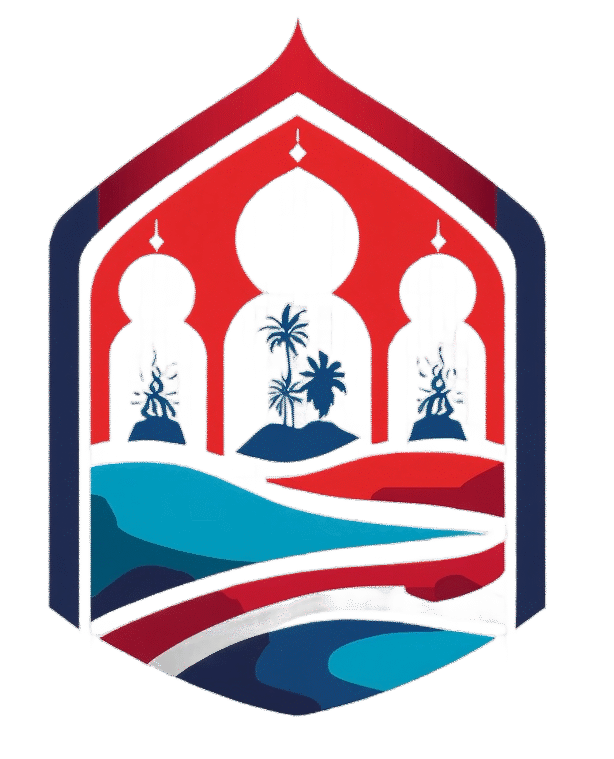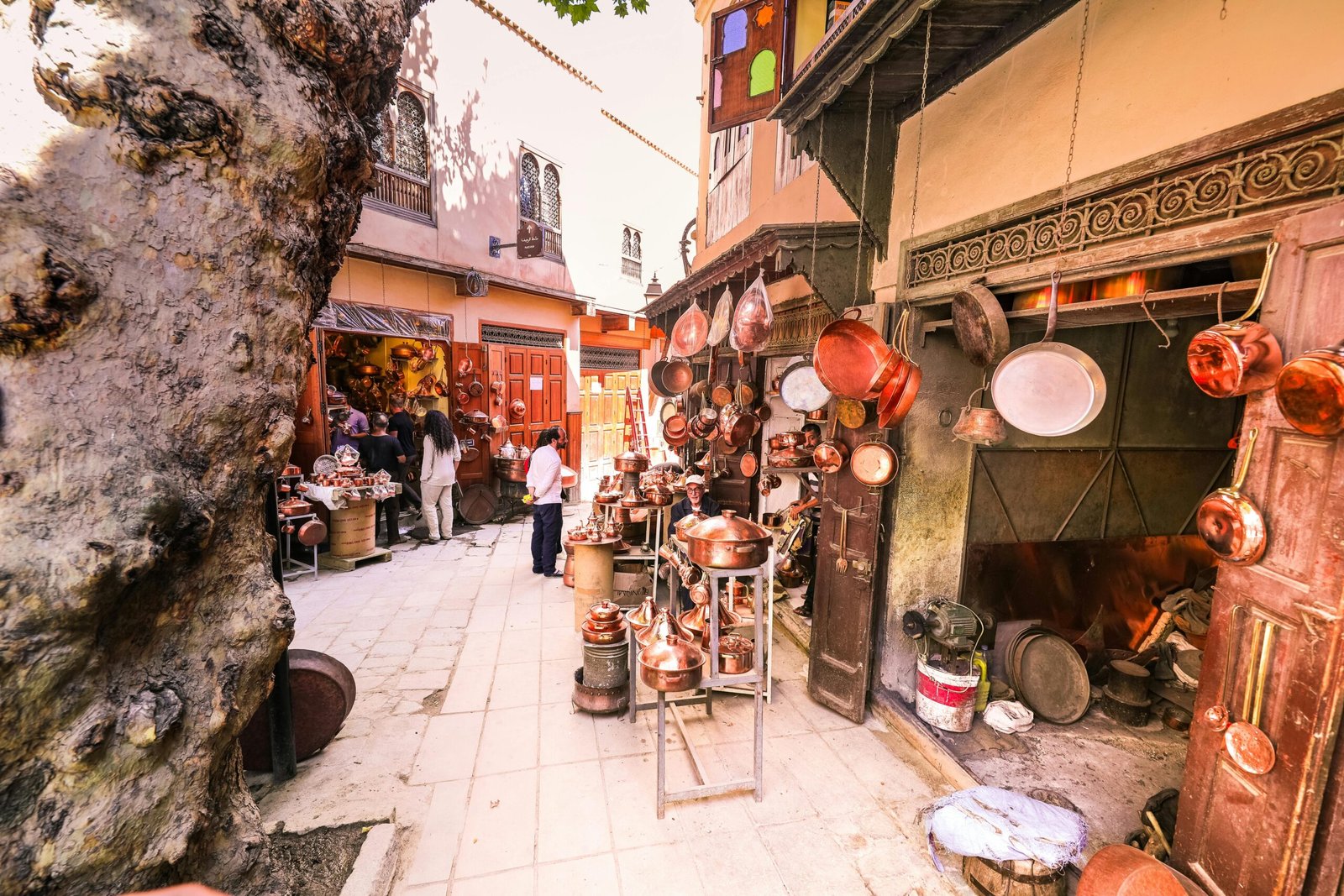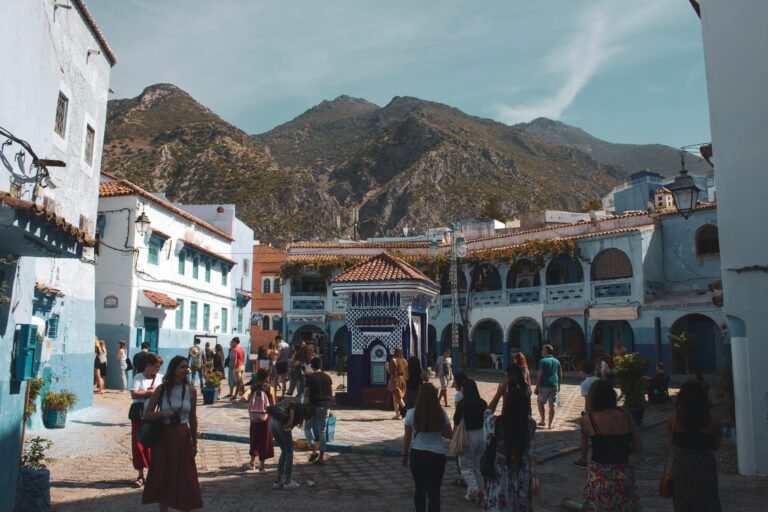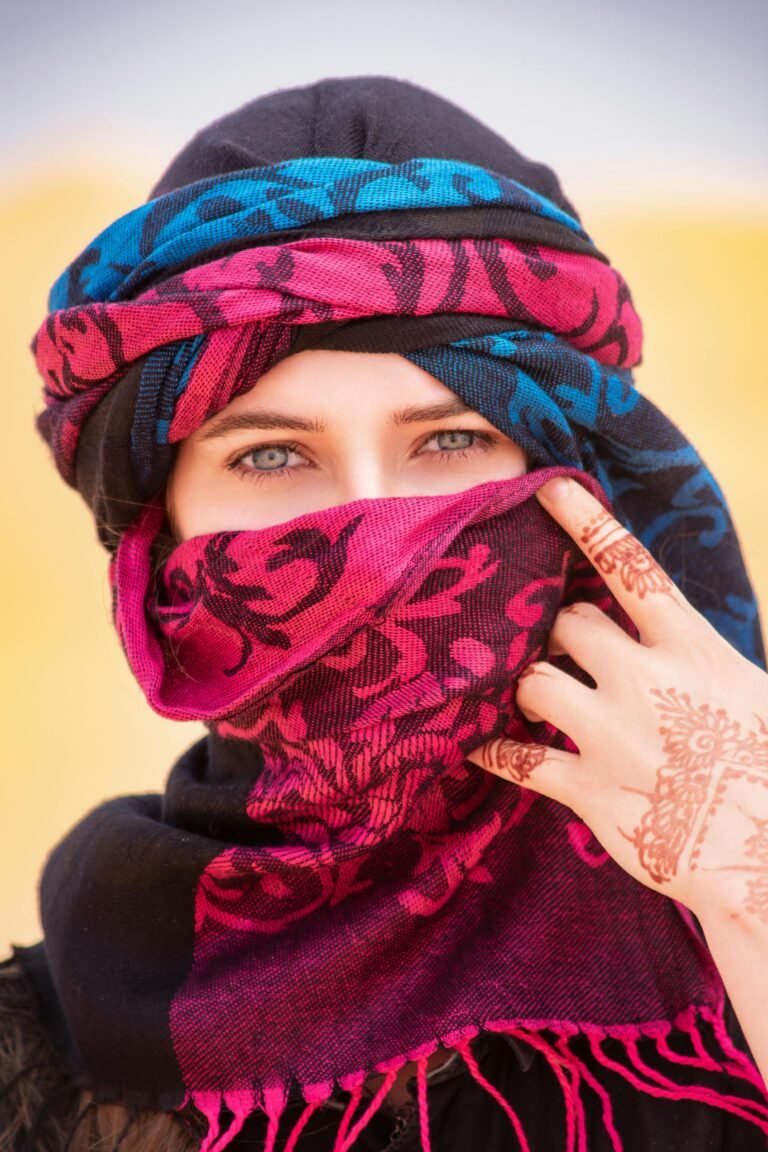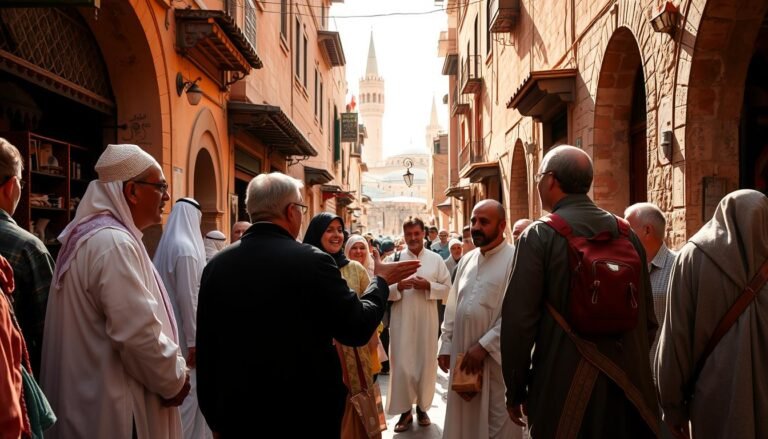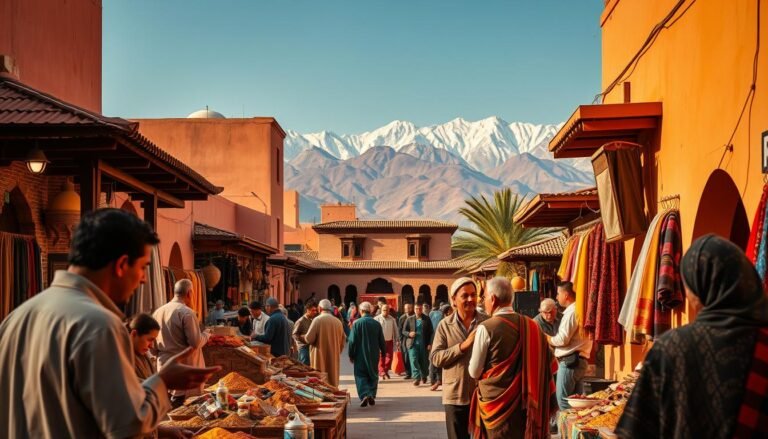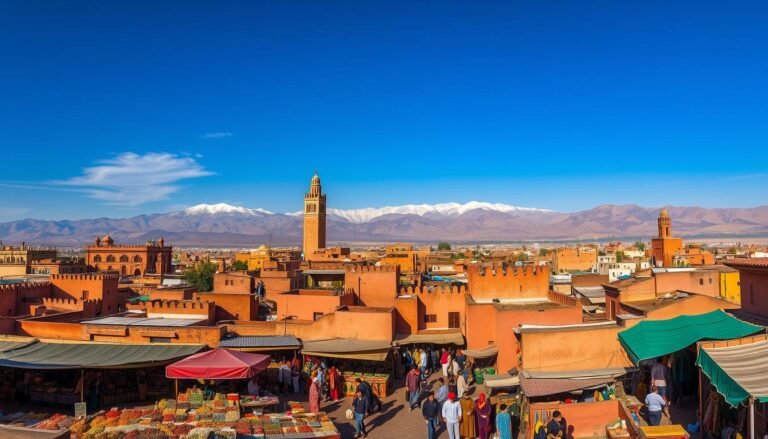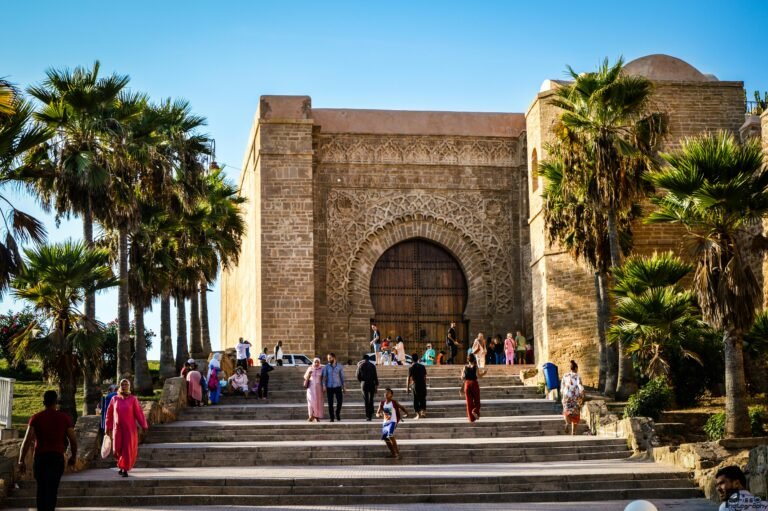Is Morocco Safe to Travel: Things Tourists Should Know
Is Morocco Safe to Travel
Every year, over 8 million tourists visit Morocco. It’s a favorite spot for travelers from the UK and beyond. The country is known for its rich culture and stunning landscapes, from the Atlas Mountains to the Sahara Desert.
Thinking about the safety of Morocco as you plan your trip? It’s normal to have some worries. But, the country has made big efforts to keep tourists safe. In this article, we’ll look at the current safety situation. We’ll also share important travel tips to help you have a safe and fun trip.
Understanding Morocco’s Safety Landscape
Planning a trip to Morocco? Knowing the safety situation is key for a great trip. Morocco is generally safe for tourists, but it has its risks.
The safety in Morocco is complex, with many factors affecting it. To stay safe, keep up with travel warnings and advisories from governments.
Current Travel Warnings and Advisories
Travel advisories help you make smart choices. For example, the U.S. State Department says Morocco is a “Level 2” safety risk. This means you should exercise increased caution due to terrorism. Always check these advisories for updates.
These advisories give you the lowdown on safety. They tell you about areas to avoid, threats, and local conditions that might impact your trip.
Government Resources for Updates
For the latest safety info, use government resources. The U.S. Department of State’s website has travel advisories, safety tips, and emergency contacts. The UK’s Foreign and Commonwealth Office also offers travel advice for British citizens.
By checking these sites often, you’ll know about any safety changes. This helps you stay safe during your Morocco visit.
Common Safety Concerns for Tourists
Planning a trip to Morocco? It’s key to know about common safety issues for tourists. This knowledge helps you travel safely and enjoy your time.
Petty Theft and Scams
Petty theft is a big problem in tourist spots. Bag snatching and pickpocketing happen a lot in busy places like markets and buses. To stay safe, keep your valuables close and use a money belt. Watch out for friendly locals who might be trying to steal from you.
Stay alert in crowded spots like Marrakech’s Jemaa el-Fnaa or Fez’s medinas. Keep your bags safe and don’t show off expensive things like jewelry or watches.
Personal Safety in Crowded Areas
Crowded places can be risky for your safety. In markets or during festivals, it’s easy to lose your group. Always have a meeting spot and carry a local SIM card or portable Wi-Fi to stay in touch.
When walking through crowded streets, keep an eye on your stuff. Avoid aggressive vendors and scammers. Stay calm and ask for help from the police if you feel scared.
By knowing what to expect and taking steps to stay safe, you can enjoy Morocco’s culture and history. Remember, being aware and prepared is the best way to have a safe and fun trip.
Best Practices for Staying Safe
To have a great trip to Morocco, follow these safety tips. Morocco is mostly safe for visitors. But, being careful and aware can make your trip even better.
Keeping Your Valuables Secure
Keeping your valuables safe is key in Morocco. Petty theft can happen in crowded places. So, use a hotel safe or a money belt for your passport, cash, and cards. Be careful with your stuff, mainly in busy markets.
When getting cash from ATMs, pick ones in safe, well-lit spots. Don’t use them at night. Cover the keypad with your hand when typing your PIN. Always check your hotel room door is locked. You might also want a portable door lock for more security.
Using Reputable Transportation Options
Choosing safe transportation is vital in Morocco. Go for licensed taxis or ride-sharing. Always agree on the fare before you start. For longer trips, use a trusted bus service or rent a car from a known company.
Don’t hail taxis on the street, mainly at night. Some might not be licensed or charge too much. Ask your hotel or a local for a reliable taxi service or driver. On public transport, stay alert and keep your things close.
By following these tips, you can have a safe and fun trip to Morocco. Whether you’re in the cities or the countryside, being ready and aware will make your trip unforgettable.
Cultural Awareness and Sensitivity
Traveling to Morocco means understanding the local culture. Morocco is a conservative Islamic society with strict gender norms. Knowing and respecting these norms will make your trip better.
Dress Code for Both Genders
Morocco’s dress code is modest. Both men and women should cover their shoulders and knees. Loose-fitting clothes that don’t show too much are best. Women might want to wear a scarf or shawl in mosques or rural places.
Local Customs and Etiquette
Knowing local customs helps avoid offense. Use your right hand when giving or taking something. This is polite, as the left hand is for personal hygiene. Also, avoid public displays of affection.
Being patient and respectful is key when meeting Moroccans. Learning basic Arabic phrases like “hello” (Marhaba) and “thank you” (Shukran) shows respect for their culture.
Safe Areas to Visit in Morocco
Planning your trip to Morocco? Knowing the safest places to go can make your journey better. Morocco is a safe country, with fewer crimes than many other tourist spots.
Recommended Cities for Tourists
Marrakech, Casablanca, and Tangier are safe for visitors. These cities are full of tourists and have lots of police around. They’re perfect for travelers.
Marrakech is famous for its lively souks and culture. It’s safe, but watch your stuff in crowded places to prevent theft.
Attractions with Enhanced Security
Many of Morocco’s best spots have extra security. The Bahia Palace and Jardin Majorelle in Marrakech are guarded and safe. The Casablanca Cathedral and Hassan II Mosque are also secure and worth seeing.
Even at these safe places, stay alert and keep an eye on your things. Using trusted tour guides can make your visit safer and more enjoyable.
Health and Safety Precautions
To enjoy your Moroccan adventure, knowing the local health and safety rules is key. Morocco has good medical care, but it’s mainly found in big cities. Knowing this can make your trip better.
Vaccination Recommendations
Before you go to Morocco, talk to your doctor about shots. Routine vaccinations like MMR, DTaP, and polio are a must. You might also need Hepatitis A and Typhoid shots, depending on your plans.
Staying Hydrated and Food Safety
It’s important to drink lots of water in Morocco’s heat. Stick to bottled or filtered water and avoid tap water. Choose fresh, cooked meals from trusted places and be careful with raw foods.
Street food can be tasty, but make sure it’s safe. Taking care of your health lets you enjoy Morocco’s cities and nature.
Navigating Morocco’s Cities
To enjoy your trip to Morocco, knowing how to safely move around cities is key. Morocco’s cities are lively, but some areas are safer than others.
Safety Tips for Urban Travel
When exploring Morocco’s cities, watch your belongings, mainly in busy spots like markets and buses. Using trusted taxis or apps can boost your safety. Also, staying updated on local news helps you steer clear of danger.
Keep your valuables secure by using hotel safes or lockers if you can. Be careful with ATMs, and don’t show off wealth (like fancy jewelry or watches).
Areas to Avoid After Dark
It’s wise to steer clear of quiet, dark places at night. Stick to bright, busy areas. Some cities have areas that aren’t safe at night, so ask locals or your hotel for tips.
Staying aware of your surroundings is vital. Keep an eye on your stuff and don’t walk alone in dark or empty streets.
Dealing with Emergencies
Emergencies can happen without warning, and being ready is essential in Morocco. Knowing how to reach local authorities and find medical help can greatly impact a situation.
Contacting Local Authorities
If an emergency strikes, call the local police or authorities for aid. Keep your country’s embassy or consulate contact info handy. They can offer support and advice. For quick help, dial 112 or 19 for the police in Morocco.
Finding Medical Assistance
Morocco has good hospitals and clinics, mainly in big cities like Marrakech and Rabat. For small problems, pharmacies are everywhere and can help. Hotels or tour operators can also help find medical care. Always have travel insurance that covers medical evacuations.
Knowing about local conditions and having a plan can keep you safe in Morocco. Being ready for emergencies makes your trip safer and more enjoyable.
Tips for Female Travelers
Planning a trip to Morocco as a female traveler? Knowing the local culture and being ready can change your trip. Morocco is safe for tourists, but it’s key to stay alert and know the customs.
Safety Considerations for Solo Female Travelers
Traveling solo in Morocco? Dress modestly to avoid unwanted stares. Wear loose clothes that cover your shoulders and knees. Also, keep an eye on your stuff, mainly in busy spots, to avoid theft.
Stay updated on local news and follow Morocco safety advice from reliable sources. Don’t travel alone at night and use safe transport.
Women’s Rights and Societal Norms
Knowing the local norms can improve your Morocco trip. Women in Morocco are making big strides, and the country welcomes female tourists. But, it’s important to respect local customs, like proper greetings and being modest in religious places.
So, is Morocco safe for solo female travelers? Yes, with the right precautions and cultural understanding. Being informed and ready ensures a safe and fun trip.
Morocco has lots of Morocco travel tips and experiences for women. Embrace the culture, try the food, and talk to the locals. It will make your trip unforgettable.
Travel Insurance: Why It’s Essential
As you get ready for your Moroccan adventure, remember the importance of travel insurance. Morocco has its own risks, like theft and medical emergencies. The right insurance can turn a small problem into a big financial issue.
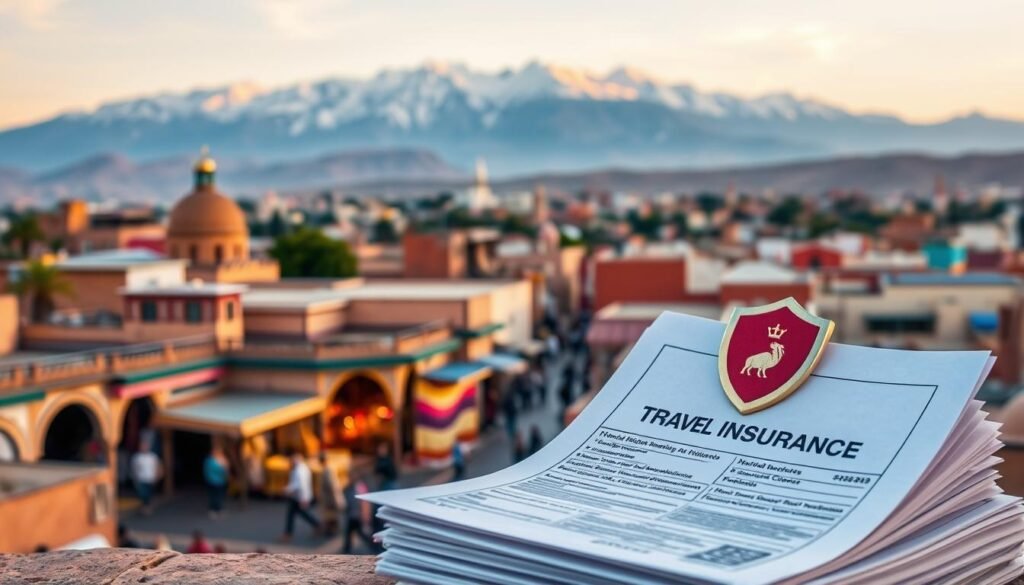
What to Look for in a Policy
When picking travel insurance for Morocco, look for a few key things. Make sure it covers medical emergencies and evacuations if needed. Also, find a policy that includes trip cancellations or interruptions. This is helpful if you’ve spent a lot on your trip.
Key Features to Consider:
- Medical coverage, including hospital stays and emergency evacuations
- Trip cancellation or interruption insurance
- Coverage for lost, stolen, or damaged luggage
- Travel delay insurance
Coverage for Unexpected Events
Travel insurance isn’t just about avoiding risks. It’s also about being ready for surprises. Morocco is usually safe, but unexpected events like natural disasters can happen. A good policy will support and protect you financially.
If you plan to do adventure activities like desert trekking or mountain hiking, check your policy. Some policies might not cover these activities. Always read the fine print carefully.
Conclusion: Making the Most of Your Trip
Morocco is a place full of rich culture, ready to give you an unforgettable trip. Make sure you’re well-prepared. Remember the safety tips and advice to enjoy your journey.
Embracing Morocco’s Rich Culture
Morocco mixes old and new in a special way. To really get into the culture, respect local customs and traditions. Dress right, learn some Arabic, and talk to the people to make your trip better.
The souks, buildings, and friendly people make Morocco exciting. Be careful with your stuff and enjoy the Moroccan lifestyle.
Final Thoughts on Safety and Enjoyment
Safety is key, but don’t forget to stay open-minded and flexible. Morocco is safe, with less crime than many places. But, knowing what’s going on and being careful will make your trip safer and more fun.
With the right safety tips, you’ll travel Morocco with confidence. A well-prepared traveler has a positive and enriching experience. So, pack up and start exploring Morocco’s wonders!
Over 8 million tourists visit Morocco every year. They come for its rich culture and stunning landscapes.
Planning a trip to Morocco? You might be thinking about safety. The truth is, with some simple steps, you can travel safely and enjoy your time.
Travel safety in Morocco is a big concern for many. Knowing the local culture and staying alert can make your trip better.
Whether you’re hiking in the Atlas Mountains or exploring cities, knowing when to visit and local customs is key. It helps you feel confident in this beautiful North African country.
Understanding Morocco’s Safety Landscape
Knowing about Morocco’s safety is key for a fun and safe trip. Before you go, it’s important to know the latest safety tips. This will help you travel safely in the country.
Current Travel Warnings and Advisories
The U.S. State Department says Morocco is a “Level 2” safety spot. This means you should exercise increased caution due to terrorism. It’s important to be careful, mainly in places tourists go and during big events.
Always watch your surroundings and tell the police if you see something odd. Keeping up with travel warnings is a smart way to stay safe.
Government Resources for Updates
For the latest news, check government sites. The U.S. State Department’s website has updates on Morocco’s safety. Also, signing up for the Smart Traveler Enrollment Program (STEP) can send you important safety alerts.
By using these resources, you can plan your trip wisely. This way, you’ll stay safe while exploring Morocco.
Common Safety Concerns for Tourists
Morocco is generally safe for visitors, but it’s good to know about some safety tips. Petty theft and scams are common issues tourists face.
Petty Theft and Scams
Petty theft is a big worry in tourist spots. Bag snatching and pickpocketing happen a lot in busy places like markets and buses. Always keep your valuables close and watch your stuff, even in crowded areas.
Scams can also be a problem. Sometimes, friendly locals might try to sell you something or offer help. Be careful of deals that seem too good to be true. Never give money without checking if it’s real.
Personal Safety in Crowded Areas
Personal safety is key in crowded places. Morocco’s busy souks and medinas can be overwhelming. It’s easy to lose your group. Stay alert and don’t show off expensive things like jewelry or watches.
Exploring crowded areas is safer with a group or a guided tour. It’s safer and you’ll learn more about the local culture.
Knowing these safety tips can help you have a safe and enjoyable trip to Morocco. For more Morocco travel tips, look into local customs and stay up to date with travel advisories.
Best Practices for Staying Safe
To have a safe and fun trip to Morocco, knowing the best safety tips is key. Being informed and ready can greatly improve your trip.
Keeping Your Valuables Secure
Keeping your valuables safe is a top priority in Morocco. Use hotel safes, lock your bags, and watch your stuff in crowded spots. Make digital copies of your important documents, like your passport and travel insurance.
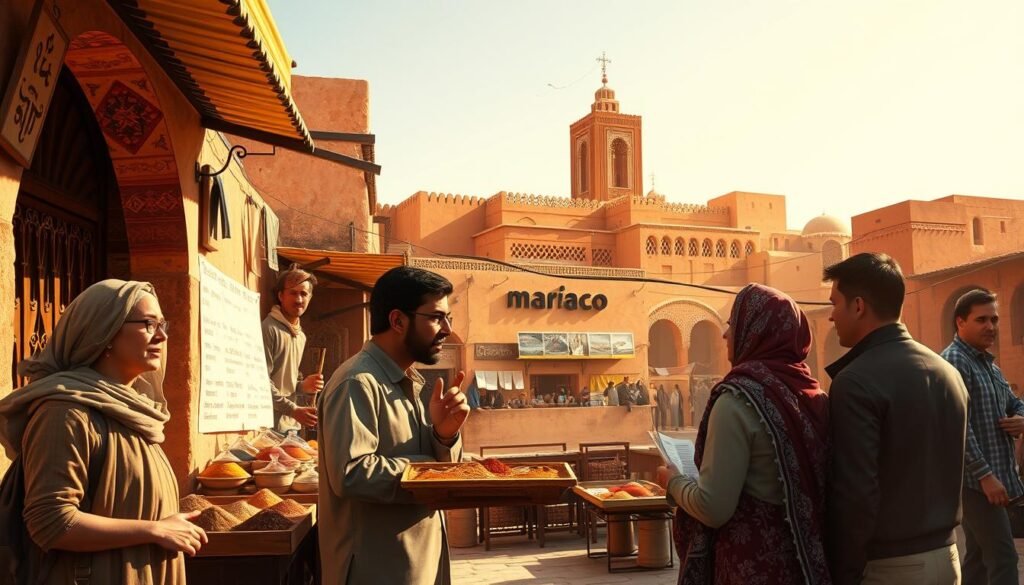
When you’re out, use a money belt or a safe bag for your things. Watch out for pickpockets in markets and tourist areas. Keeping your valuables close and being alert can lower theft risks.
Using Reputable Transportation Options
Choosing safe transportation is also vital. Go for licensed taxis or ride-sharing, and set the fare before you start. On public transport, keep an eye on your stuff and don’t travel alone at night.
For longer trips, rent a car from a trusted company or book a private transfer. This adds safety and ease, even if you don’t know the roads or language.
By following these tips, you can have a safe and memorable trip to Morocco. Stay informed, be aware, and use trusted services for a worry-free journey.
Cultural Awareness and Sensitivity
Before you go to Morocco, it’s key to know the local culture. Morocco is a place where tradition and religion are big. Knowing this helps you get along and enjoy your trip.
Dress Code for Both Genders
In Morocco, people dress modestly. Both men and women should cover their shoulders and knees. Loose-fitting clothes are good for the heat and respect.
Women might want to wear a scarf or head covering in mosques or rural spots.
Even though Morocco is more open than some places, dressing right helps you fit in. Dress codes can change based on where you are, so it’s smart to dress conservatively.
Local Customs and Etiquette
Knowing local customs is important for a smooth trip in Morocco. Always use your right hand for things like eating or giving. The left hand is seen as dirty.
Also, don’t show too much affection in public. It’s better to be a bit more private with your friends.
When you visit homes or mosques, take off your shoes. Saying hello in Arabic (“as-salamu alaykum”) and “thank you” (“shukran”) shows you respect the culture.
Safe Areas to Visit in Morocco
Morocco is a diverse country with many safe spots for tourists. It has a strong tourist infrastructure. Many areas are designed to meet the needs of visitors.
Recommended Cities for Tourists
Cities like Marrakech, Casablanca, and Tangier are safe for travelers. They have lots of security and services for tourists. This makes them great places to visit.
Marrakech is famous for its lively souks and historic sites. You can safely see the Medina, Bahia Palace, and Jardin Majorelle. There’s a lot to see and do.
Attractions with Enhanced Security
Many top attractions in Morocco have better security. For example, Chefchaouen is not only beautiful but also safe. It has a calm vibe and lots of police around.
Visitors can also enjoy Essaouira’s beaches, Volubilis’ historic sites, and Fez’s busy streets. You’ll feel safe because of the visible security.
By visiting these safe areas and being aware of your surroundings, you can have a great time in Morocco.
Health and Safety Precautions
To enjoy your Moroccan adventure, knowing the health and safety tips is important. Morocco has good medical care, but it’s mainly found in big cities. So, being ready and knowing what to do is key for a safe and fun trip.
Vaccination Recommendations
Before you go to Morocco, talk to your doctor about shots you need. Routine vaccinations like MMR, DTaP, and polio are a must. You might also need shots for Hepatitis A and Typhoid based on your plans. Getting these shots can help you stay healthy while traveling.
Staying Hydrated and Food Safety
It’s important to drink lots of water, even more so in Morocco’s hot cities and sites. Stick to bottled or filtered water. Morocco’s food is tasty, but eat at safe places to avoid getting sick. Avoid raw meat or veggies and choose fruits you can peel. This way, you can enjoy Morocco’s food safely.
By following these health and safety tips, you’ll have a great time in Morocco. Whether you’re in Marrakech’s souks or Essaouira’s beaches, being ready is the first step to a wonderful trip.
Navigating Morocco’s Cities
To enjoy Morocco fully, knowing how to safely move around cities is key. With the right Morocco safety advice, you can explore the culture and lively scenes without worry.
Safety Tips for Urban Travel
When in Morocco’s cities, always be mindful of your surroundings. Don’t show off wealth like expensive jewelry or watches. Keep your valuables safe and use trusted transport services.
Be careful with ATMs or money exchanges, mainly in crowded spots or at night. Knowing the city’s layout, including embassy or consulate locations, police stations, and landmarks, is smart. This info is useful in emergencies. For is Morocco safe for solo female travelers, dressing modestly and avoiding night travel alone is wise.
Areas to Avoid After Dark
Morocco’s cities are mostly safe in the day but can be risky at night. Stay away from quiet, dark places and choose busy, well-lit streets. Areas with lots of tourists can attract thieves or scammers.
Keep up with local news and follow travel safety Morocco tips for a safe trip. Always listen to your gut; if something feels off, leave the area.
Dealing with Emergencies
When traveling in Morocco, knowing what to do in an emergency is vital. This could be a medical issue, a lost passport, or another crisis. Being ready can help solve the problem quickly.
Contacting Local Authorities
If you’re in an emergency, call the local authorities first. Morocco has a tourist police in big cities to help visitors. You can also reach out to your embassy or consulate for help.
Emergency Numbers: Dial 19 for police help in Morocco if you need it.
Finding Medical Assistance
Morocco has public and private hospitals for medical emergencies. Cities like Marrakech and Rabat have good hospitals. Make sure you have travel insurance that covers medical evacuations if needed.
Tip: Keep important phone numbers, like your embassy and local emergency services, handy.
Knowing how to use these resources can make your trip safer in Morocco. For more travel tips and warnings, check your government’s travel website.
Tips for Female Travelers
As a female traveler, you might worry about safety in Morocco. Morocco is full of culture and beauty, but knowing local customs is key. Dressing modestly helps avoid unwanted attention.
Safety Considerations for Solo Female Travelers
Traveling solo means being careful, mainly in crowded places. Don’t show off expensive items and keep valuables safe. Using trusted transport and staying in safe areas at night is smart.
Dressing modestly shows respect for local customs. Covering your shoulders and knees helps you blend in and avoid unwanted stares.
Women’s Rights and Societal Norms
Knowing about women’s rights and local norms in Morocco is important. Morocco is conservative, but there’s progress too. Being respectful makes your trip better and safer.
Remember, harassment can happen, but being alert and confident can help. Meeting other travelers and locals, and staying updated, also boosts your safety.
Travel Insurance: Why It’s Essential
As you get ready for your Moroccan adventure, getting the right travel insurance is key. Morocco is known for its beautiful landscapes and rich culture. But, like any trip, it comes with risks. Travel insurance helps protect you from unexpected events that could ruin your trip.
When picking a travel insurance policy for Morocco, think about a few important things. Medical coverage is a must, covering medical emergencies like hospital stays. Also, look for trip cancellation or interruption insurance. This can help if you have to cancel or shorten your trip for unexpected reasons.
What to Look for in a Policy
A good travel insurance policy should cover many situations. Make sure it includes medical evacuations for serious conditions. It should also cover personal belongings and luggage, and travel delays. It’s important to understand the policy’s details, like the deductible, coverage limits, and what’s not covered.
Coverage for Unexpected Events
Unexpected events can include illness or natural disasters. A good policy will cover these, so you don’t lose a lot of money. For Morocco, think about getting coverage for terrorism or civil unrest. But, this depends on your travel plans and the current situation.
Choosing the right travel insurance policy lets you enjoy Morocco more. You’ll have peace of mind, knowing you’re protected from many risks.
Conclusion: Making the Most of Your Trip
Planning your trip to Morocco? Being informed and prepared is essential for a safe and fun journey. Morocco is a mix of cultural richness and natural beauty. By knowing the local safety tips, you can dive into Morocco’s vibrant culture and stunning landscapes.
Cultural Immersion and Awareness
Embracing Morocco’s culture means being aware of local customs and traditions. Dress modestly, respect local etiquette, and know the best time to visit Morocco. With safety advice in mind, you can explore the cities and countryside confidently.
Staying Safe and Enjoying Your Journey
Is Morocco Safe to Travel? With the right tips, your trip can be rewarding. Stay alert, keep valuables safe, and use trusted transport. Being prepared lets you enjoy Morocco’s beauty and hospitality.
